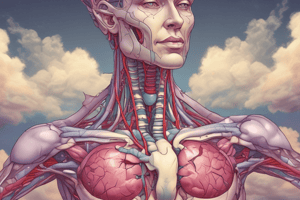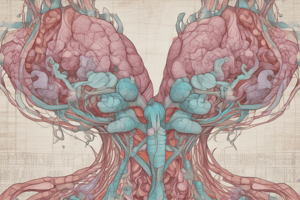Podcast
Questions and Answers
What is the main function of thyroid hormone?
What is the main function of thyroid hormone?
- Regulate metabolism, heart rate, and cardiac output (correct)
- Promote bone growth and development
- Support the immune system
- Regulate blood sugar levels
What is the most common cause of hyperthyroidism?
What is the most common cause of hyperthyroidism?
- Toxic multinodular goiter
- Pituitary tumor
- Thyroiditis
- Grave's disease (correct)
What is exophthalmos?
What is exophthalmos?
- Nodule formation in the thyroid gland
- Bulging of the eyes (correct)
- Inflammation of the thyroid gland
- Enlargement of the thyroid gland
What medication is used to treat hypothyroidism?
What medication is used to treat hypothyroidism?
What is the pathophysiology of Hashimoto's hypothyroidism?
What is the pathophysiology of Hashimoto's hypothyroidism?
What is the main side effect of levothyroxine that patients must report to their healthcare provider?
What is the main side effect of levothyroxine that patients must report to their healthcare provider?
What is necessary to produce thyroid hormone?
What is necessary to produce thyroid hormone?
What are the two main thyroid hormones produced by the thyroid gland?
What are the two main thyroid hormones produced by the thyroid gland?
What is the purpose of Methimazole in treating hyperthyroidism?
What is the purpose of Methimazole in treating hyperthyroidism?
What is the common cause of exophthalmos?
What is the common cause of exophthalmos?
What is the function of Levothyroxine?
What is the function of Levothyroxine?
What is the main cause of Addison's disease?
What is the main cause of Addison's disease?
What is the function of Aldosterone?
What is the function of Aldosterone?
What is the opposite of Diabetes Insipidus?
What is the opposite of Diabetes Insipidus?
What is the MOA of Desmopressin?
What is the MOA of Desmopressin?
What is the side effect of Desmopressin?
What is the side effect of Desmopressin?
What is the route of administration for Desmopressin?
What is the route of administration for Desmopressin?
What is the function of Spirinolactone?
What is the function of Spirinolactone?
What is the function of aldosterone?
What is the function of aldosterone?
What medication is similar to a synthetic aldosterone?
What medication is similar to a synthetic aldosterone?
Which of the following is a symptom of Addison's disease?
Which of the following is a symptom of Addison's disease?
What is Cushing's Syndrome?
What is Cushing's Syndrome?
What is the suffix of steroids?
What is the suffix of steroids?
When would you take a steroid with meals or without meals?
When would you take a steroid with meals or without meals?
What is the function of hydrocortisone?
What is the function of hydrocortisone?
What kind of symptomatic support would a patient with Addison's disease need?
What kind of symptomatic support would a patient with Addison's disease need?
Which of the following is a side effect of steroids?
Which of the following is a side effect of steroids?
How would you treat a patient in Addison's crisis?
How would you treat a patient in Addison's crisis?
What are the typical doses for Spironolactone?
What are the typical doses for Spironolactone?
What is a common side effect of Spironolactone?
What is a common side effect of Spironolactone?
What is the condition caused by high aldosterone and high cortisol levels?
What is the condition caused by high aldosterone and high cortisol levels?
What is a potential cause of Cushing's Syndrome?
What is a potential cause of Cushing's Syndrome?
Which of the following is a symptom of Addison's Disease?
Which of the following is a symptom of Addison's Disease?
What is the recommended treatment for hyperglycemia in a patient with Addison's Disease?
What is the recommended treatment for hyperglycemia in a patient with Addison's Disease?
What is the primary mechanism by which steroids suppress inflammation?
What is the primary mechanism by which steroids suppress inflammation?
Why is it important to taper steroid dosage gradually?
Why is it important to taper steroid dosage gradually?
Flashcards are hidden until you start studying
Study Notes
Endocrine System Overview
- Thyroid gland is not palpable.
- Thyroid hormones are produced by the thyroid gland.
- Main thyroid hormones: Triiodothyronine (T3) and Thyroxine (T4).
- Thyroid hormone regulates metabolism, heart rate, and supports growth and brain maturation.
- Signs of thyroid disease primarily affect metabolism and cardiac function.
- Iodine is essential for thyroid hormone production.
Hyperthyroidism
- Most common cause is Graves’ disease, an autoimmune disorder.
- Pathophysiology involves immunoglobulins stimulating thyroid hormone synthesis via TSH receptors.
- Exophthalmos is characterized by bulging eyes due to fluid accumulation in tissues.
- Symptoms include weight loss, diarrhea, heat intolerance, anxiety, sweating, tachycardia, and exophthalmos.
- Treatment options include thyroidectomy and radioactive iodine.
- Methimazole (Tapazole) is a prototype medication.
- It inhibits the synthesis of thyroid hormones in the thyroid gland.
- Clinical effectiveness of Methimazole is monitored by a decrease in hyperthyroid symptoms.
- Risks of overtreatment include extreme hypothyroidism, fever, rash, and leukopenia due to agranulocytosis.
- Agranulocytosis is a severe drop in granulocyte count, increasing infection risk.
- Regular CBC and liver function tests are necessary due to Methimazole's potential hepatotoxicity.
Jaundice
- Jaundice is a sign of hepatic failure, marked by elevated bilirubin leading to yellowing of the skin and eyes.
- Always assess the sclera for signs of jaundice.
Hypothyroidism
- Most common cause is Hashimoto’s thyroiditis, an autoimmune condition.
- Pathophysiology involves fibrotic tissue formation due to antibody attacks on the thyroid, leading to decreased hormone production.
- Treatment involves Levothyroxine (Synthroid), a synthetic T4 hormone.
- Levothyroxine is administered PO or IV, converting to T3 in the body.
- Effectiveness is indicated by an increase in metabolic rate.
- Side effects include tachycardia, palpitations, and anxiety; report any signs of hyperthyroidism.
Diabetes Insipidus (DI)
- Symptomatic support focuses on alleviating symptoms rather than treating underlying causes.
- Examples include pain management, fever reduction, and treating respiratory symptoms.
- Beta blockers or antihypertensives may address hyperthyroid symptoms.
- Antidiuretic hormone (ADH) is also known as vasopressin, promoting water retention in kidneys.
- Diabetes refers to excessive urination; Diabetes Insipidus is characterized by low ADH.
- Syndrome of Inappropriate Antidiuretic Hormone (SIADH) involves high ADH levels and fluid retention.
- DI results in dilute urine and low specific gravity. Common causes include pituitary damage.
- Treatment for DI includes Desmopressin Acetate (DDAVP), administered through various routes (nasal, SubQ, IV).
- Desmopressin increases urine concentration by enhancing water reabsorption in renal ducts.
- Hyponatremia symptoms include altered mental status and seizures.
Adrenal Function and Disorders
- The adrenal cortex produces mineralocorticoids (Aldosterone) and glucocorticoids (Cortisol).
- Aldosterone promotes sodium reabsorption and potassium secretion.
- Cortisol provides energy during stress.
- Spironolactone acts as an aldosterone antagonist, leading to sodium excretion while retaining potassium.
- Spironolactone doses vary: typically 50-100 mg for hypertension and 200-400 mg for anti-androgen effects.
- Main side effect of spironolactone: Hyperkalemia (high potassium levels).
- Addison’s disease results in low aldosterone and cortisol, mainly caused by autoimmune destruction.
- Treatment includes long-term steroids like hydrocortisone, which increases both hormones.
- Cushing’s Syndrome arises from excessive cortisol and aldosterone, often due to adrenal hypersecretion or steroid use.
- Treatment for Cushing’s involves reducing steroid use, surgical intervention, and symptomatic support.
- Symptoms of Addison’s include fatigue, dehydration, and hypotension; an adrenal crisis can lead to vascular collapse and renal shutdown.
- Cushing's symptoms include personality changes, moon facies, and purple striae.
- Education on steroids emphasizes the need for gradual tapering to prevent withdrawal effects and stress management.
Steroid Management
- Steroids serve multiple purposes, from inflammation management to treating autoimmune conditions.
- Common steroid suffix: -sone (e.g., prednisone, dexamethasone).
- When taking steroids, timing related to meals is advised based on gastrointestinal tolerance or absorption issues.
- Potential side effects include hypertension, immunosuppression, mood changes, and weight gain.
Studying That Suits You
Use AI to generate personalized quizzes and flashcards to suit your learning preferences.




